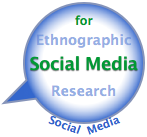 Ethnographic research for social media initiatives shows how ethnography can change the rules of social media programs in marketing, customer service, product development, recruiting and others. Ethnographic research enables teams to understand the people who are most important to your firm so they can relate to them at a completely different level. Moreover, interacting in digital public activates the network effect and the annuity effect, so it’s very scalable. Since your teams interact in digital public, where a far larger group of like people observes the interactions, they influence a large group of people and build relationships with them. People start trusting your firm, preferring your firm, and doing more business with you. See the Trust Business Chain Reaction and infographic for how it monetizes.
Ethnographic research for social media initiatives shows how ethnography can change the rules of social media programs in marketing, customer service, product development, recruiting and others. Ethnographic research enables teams to understand the people who are most important to your firm so they can relate to them at a completely different level. Moreover, interacting in digital public activates the network effect and the annuity effect, so it’s very scalable. Since your teams interact in digital public, where a far larger group of like people observes the interactions, they influence a large group of people and build relationships with them. People start trusting your firm, preferring your firm, and doing more business with you. See the Trust Business Chain Reaction and infographic for how it monetizes.
Ethnographic research for social media initiatives is a game-changer for customer experience and digital transformation programs in multiple phases. It’s faster, less costly, and scalable. It provides an unprecedented combination of qualitative and quantitative research.
[…]

 ZDNet reports on “research” that finds that websites provide 7 times more sales leads than “social media.” Unfortunately, the writer doesn’t appreciate the self-irony in the second paragraph: “A company’s corporate website was found to be the top source of new sales leads online — second only to personal referrals..”
ZDNet reports on “research” that finds that websites provide 7 times more sales leads than “social media.” Unfortunately, the writer doesn’t appreciate the self-irony in the second paragraph: “A company’s corporate website was found to be the top source of new sales leads online — second only to personal referrals..”